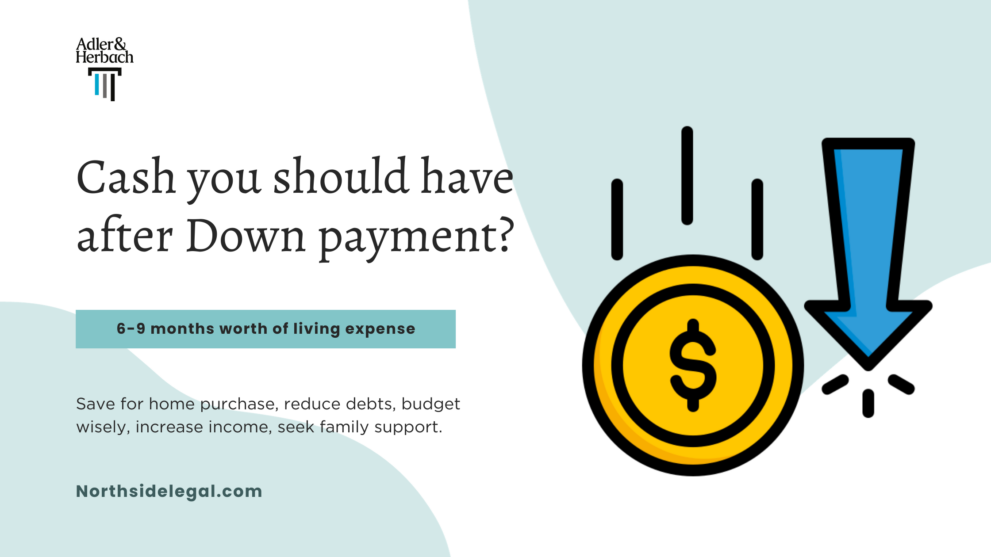Buying a home is an exciting milestone in life but also requires careful financial planning. One of the biggest questions homebuyers face is how much cash they should have leftover after putting down their down payment.
How much Cash should you have After Down payment?
After making a down payment on a home, it’s crucial to have 6 to 9 months’ worth of living expenses saved up. This acts as a safety net for unexpected costs and income loss. To accumulate enough post-purchase reserves, focus on building savings early, reducing debts, maintaining a lean budget, increasing income where possible, saving windfalls, choosing favorable mortgage terms, and seeking family support if needed. Be prepared for other expenses like closing fees, moving costs, furnishing costs, potential repairs, and ongoing mortgage payments.

Home Buyer’s Essential Guide
Get the Secrets to a Smooth Home Buying Experience!

Expert-Curated Guide:
- 43-page, mobile-friendly guide for first-time home buyers.
- Covers all aspects from mortgage acquisition to home settlement.
- Touted as the only needed guide for homebuyers.
- Widely praised by locals.
1. The Down Payment
A down payment is the upfront payment you make when purchasing a home to secure the mortgage loan. Typical down payments range from 3% to 20% of the total home price, depending on the type of mortgage. Conventional loans require at least 3% down, but can require more based on your credit profile. FHA and VA loans allow down payments as low as 3.5%. The more you can put down upfront, however, the better – a 20% down payment avoids private mortgage insurance and shows the lender you are financially secure.
As a general rule, your down payment should be enough to demonstrate commitment to the home without depleting all your savings. Work within your budget, factoring in closing costs, moving expenses, and the costs of owning a home. Lenders allow down payments gifted by relatives, which you may want to take advantage of, since your down payment is just the beginning – you’ll also need post-closing cash to provide security after closing.
2. Post-Closing Cash Needs
Once you’ve put money down and finalized the purchase, how much should you have left in the bank? Here are some factors that determine ideal post-closing cash reserves:
- Emergency fund – Financial experts recommend a minimum 3-6 months of living expenses in savings as a cushion against unexpected expenses and income loss. Don’t drain all your cash on a down payment.
- Closing costs – Closing costs like origination fees, points, appraisal fees, inspection fees, taxes, insurance, title fees, etc. can cost 3-4% of the home’s price. You need to take these costs into consideration when saving for your home purchase.
- Moving and furnishings – Furnishing and moving into a new home can easily cost thousands. Budget 2-5% of the home’s price for moving trucks, storage, furniture, appliances, decor, etc.
- Home repairs and maintenance – Owning a home comes with surprise repairs – budget 1-2% of the value as savings specifically for maintenance like plumbing leaks, HVAC repairs, broken appliances, leaky roofs, etc.
- Remodeling or renovations – Many buyers want to customize their home upon moving in through painting, flooring, knocking down walls, etc. Budget for any major remodeling or plan more minor cosmetic renovations into your post-purchase budget.
- Mortgage payments – Make sure you have savings to continue paying your mortgage for at least 1-2 months in case of job loss or other financial difficulty.
- Lifestyle inflation – Avoid “house fever” where you splurge on furnishings, decor, and inflate your lifestyle because of the new home. Stick to a reasonable budget.
Given all of these factors, most experts recommend having a minimum of 6-9 months’ worth of living expenses after closing. Some advise having up to 20% of the home’s value leftover in cash reserves, though this is not practical for every home buyer. Ultimately how much you need depends on your own financial situation.
3. Building Post-Closing Savings
Here are some tips for building up your post-purchase cash reserves:
- Start saving early – Set specific monthly savings goals and begin saving as soon as you start considering buying a home. Time gives money the chance to grow.
- Reduce debts – Pay down credit cards, auto loans, student loans, and other debts so you have lower fixed monthly payments.
- Create a lean budget – Audit your expenses and trim discretionary spending to dedicate maximum savings to home buying. Move to needs-based spending.
- Increase income – Consider taking on freelance work or a side gig like rideshare driving for extra income to boost savings.
- Save windfalls – Put tax refunds, bonuses, inheritance money, or monetary gifts directly into savings.
- Choose your mortgage carefully – Compare mortgage terms to find the most favorable interest rate and monthly payment so your post-closing budget isn’t squeezed.
- Get help from family – If possible, family members may be able to gift a portion of your down payment or help furnish the new home. Their support can help you avoid draining all your savings.
It takes diligence and disciplined saving to accumulate enough post-purchase reserves. But entering homeownership with strong cash reserves provides stability and financial protection.
Talk to mortgage lenders to understand all costs and get your full financial picture. With adequate planning, you can make a down payment AND retain savings to thrive in your new home.

